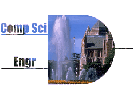
|

CSE 590W - Computers and Disabilities, Fall 2006 |
|
 CSE Home CSE Home |
 About Us About Us |
 Search Search |
 Contact Info Contact Info |
Computers are playing an ever more important role in assistive technology for a wide range of disabilities. In this seminar, we will explore the state of the art and current research in computer-based assistive technology for blindness, deafness, cognitive impairment, and other disabilities.
The seminar will include a mix of lectures, invited speakers, and discussions of recent research papers. Many papers from the ASSETS 2006 conference will be discussed. Please look at the Technical Program for topic ideas.
No particular background is required. Non-computer science majors and undergraduates may (and are encouraged) to attend with permission of the instructors. CSE graduate students who wish to attend and participate in the discussions may register for 1 credit. Students who, in addition, wish to do a project may register for 3 credits with permission of the instructors.
Talks are generally 30 minutes followed by 20 mintues of discussion. In some cases students will read papers prior to a discussion. All talks and discussions are in CSE 303 on Wednesdays at 9:30 - 10:20 am.
Leading discussion on a paper/topic: paper summary should take 10-15 minutes (assume everyone has already read the paper), discussion points should encourage discussion for remaining hour.
Organizers: Richard Ladner and Anna Cavender
Potential Papers/Topics with dates and discussion leaders:
| Date | Paper | Discussion Leader |
| 10/4 | Physical disabilities and computing technologies: an analysis of impairments. A more accessible version. Andrew Sears and Mark Young |
Susumu |
| 10/11 | Disability Perspective: Models, Language, and Identity Required Reading: Optional Reading: |
Kate |
| 10/18 | UW Campus Disability Resources | Tim |
| 10/25 | NO CLASS | |
| 11/1 | Jeff | |
| 11/8 | PDF American Sign Language Recognition in Game Development for Deaf Children. Helene Brashear, Kwang-Hyun Park, Seungyon Lee, Valerie Henderson, Harley Hamilton and Thad Starner |
Neva |
| 11/15 | PDF Dynamically Adapting GUIs to Diverse Input Devices. Carter, S., A. Hurst, J. Mankoff, and J. Li |
Shaun |
| 11/22 | PDF Lambda: A Multimodal Approach to Making Mathematics Accessible to Blind Students. Edwards, A. D. N., H. McCartney and F. Fogarolo |
Sang Yun |
| 11/29 | PDF Improvements in vision-based pointer control. (Winner of Best Paper Award) Kjeldsen, R. |
Marianne |
| 12/6 | Web Accessibility Issues (cont.) Jeff will report on the goings on at the "Accessible Web CBI" conference |
Jeff |
| Other Ideas: | ||
| PDF Developing Steady Clicks: A Method of Cursor Assistance for People with Motor Impairments. Trewin, S., Keates, S., and Moffatt, K. |
||
| PDF Measuring Website Usability for the Visually Impaired. Henrik Tonn-Eichstädt |
||
| PDF Where's my stuff? Design and Evaluation of a Mobile System for Locating Lost Items for the Visually Impaired. Kientz, J. A., Patel, S. N., Tyebkjan, A. Z., Gane, B., Wiley, J., Abowd, G.D. |
||
| PDF Using an Audio Interface to Assist Blind Users with Steering Tasks. Cohen, R. F., Haven, V., Lanzoni, J. A., Meacham, A., Skaff, J., Wissell, M. |
||
| PDF A Voice-activated Syntax-directed Editor for Manually Disabled Programmers. Hubbell, Thomas; Langan, David D.; and Hain, Thomas F. |
||
| PDF Non-speech input vs. speech recognition. Sporka, A.J., Kurniawan, S.H., Mahmud M., Slavik, P. |
||
| Computer Science & Engineering University of Washington Box 352350 Seattle, WA 98195-2350 (206) 543-1695 voice, (206) 543-2969 FAX [comments to ladner] | |